Похожие презентации:
Implementation of std::common_type
1.
Skatkov AlexImplementation of std::common_type
2.
On topic-
Metafunctions using specializations
Metafunctions using SFINAE
Implementation of std::common_type
3.
Template specializationtemplate<class T>
class container {
T content{};
};
int main() {
container<int> cont1;
container<char> cont2;
container<std::vector<int>> cont3;
}
4.
Template specializationtemplate<class T>
class container {
T content{};
};
int main() {
container<int> cont1; //OK
container<char> cont2; //OK
container<std::vector<int>> cont3; //OK
}
5.
Template specializationstruct Special {
Special(int){}
Special() = delete;
};
6.
Template specializationstruct Special {
Special(int){}
Special() = delete;
};
template<class T>
class container {
T content{};
};
int main() {
container<Special> cont;
}
7.
Template specializationstruct Special {
Special(int){}
Special() = delete;
};
template<class T>
class container {
T content{}; //error: use of deleted function ‘container<Special>::container()’
};
int main() {
container<Special> cont;
}
8.
Template specializationstruct Special { /* ... */ };
template<class T>
class container { /* ... */ };
template<>
struct container<Special> {
Special content{0};
};
int main() {
container<Special> cont;
}
9.
Template specializationstruct Special { /* ... */ };
template<class T>
class container { /* ... */ };
template<>
struct container<Special> {
Special content{0};
};
int main() {
container<Special> cont; //OK
}
10.
std::is_sametemplate<class U, class V>
struct is_same {
static const bool value = false;
};
template<class T>
struct is_same<T, T> {
static const bool value = true;
};
11.
std::is_sametemplate<class U, class V>
struct is_same { /* ... */ };
template<class T>
struct is_same<T, T> { /* ... */ };
int main() {
static_assert(is_same<int******, int******>::value);
static_assert(not is_same<int, char &>::value);
}
12.
std::is_sametemplate<class U, class V>
struct is_same { /* ... */ };
template<class T>
struct is_same<T, T> { /* ... */ };
int main() {
static_assert(is_same<int******, int******>::value);
static_assert(not is_same<int, char &>::value);
}
13.
std::is_sametemplate<class U, class V>
struct is_same { /* ... */ };
template<class T>
struct is_same<T, T> { /* ... */ };
int main() {
static_assert(is_same<int******, int******>::value);
static_assert(not is_same<int, char &>::value);
}
14.
std::remove_referencetemplate<class T>
struct remove_reference {
using type = T;
};
template<class T>
struct remove_reference<T&> {
using type = T;
};
template<class T>
struct remove_reference<T&&> {
using type = T;
};
15.
std::remove_referencetemplate<class T>
struct remove_reference {
using type = T;
};
template<class T>
struct remove_reference<T&> { // If l-reference
using type = T;
};
template<class T>
struct remove_reference<T&&> {
using type = T;
};
16.
std::remove_referencetemplate<class T>
struct remove_reference {
using type = T;
};
template<class T>
struct remove_reference<T&> { // If l-reference
using type = T;
};
template<class T>
struct remove_reference<T&&> { //If r-reference
using type = T;
};
17.
std::remove_referencetemplate<class T>
struct remove_reference { //Any other type (not
reference)
using type = T;
};
template<class T>
struct remove_reference<T&> { // If l-reference
using type = T;
};
template<class T>
struct remove_reference<T&&> { //If r-reference
using type = T;
};
18.
std::remove_reference// is_same def
// remove_reference def
int main() {
static_assert(is_same<remove_reference<int&&>::type, int>::value);
static_assert(is_same<remove_reference<char**&>::type, char**>::value);
static_assert(is_same<remove_reference<bool*>::type, bool*>::value);
}
19.
std::remove_reference//...
template<class T>
struct remove_reference<T&&> { // If r-reference
using type = T;
};
//...
int main() {
static_assert(is_same<remove_reference<int&&>::type, int>::value);
static_assert(is_same<remove_reference<char**&>::type, char**>::value);
static_assert(is_same<remove_reference<bool*>::type, bool*>::value);
}
20.
std::remove_reference//...
template<class T>
struct remove_reference<T&> { // If l-reference
using type = T;
};
//...
int main() {
static_assert(is_same<remove_reference<int&&>::type, int>::value);
static_assert(is_same<remove_reference<char**&>::type, char**>::value);
static_assert(is_same<remove_reference<bool*>::type, bool*>::value);
}
21.
std::remove_reference//...
template<class T>
struct remove_reference { //Any other type (not reference)
using type = T;
};
//...
int main() {
static_assert(is_same<remove_reference<int&&>::type, int>::value);
static_assert(is_same<remove_reference<char**&>::type, char**>::value);
static_assert(is_same<remove_reference<bool*>::type, bool*>::value);
}
22.
std::is_consttemplate<class T>
struct is_const {
static const bool value = false;
};
template<class T>
struct is_const<const T> {
static const bool value = true;
};
23.
std::is_function24.
std::is_function25.
std::is_function26.
std::is_function27.
std::is_functiontemplate<class T>
struct is_function {
static const bool value = not std::is_const<const T>::value;
};
template<class T>
struct is_function<T&> {
static const bool value = false;
};
template<class T>
struct is_function<T&&> {
static const bool value = false;
};
28.
std::is_functiontemplate<class T>
struct is_function {
static const bool value = not std::is_const<const T>::value;//Only functions and references have this trait
};
template<class T>
struct is_function<T&> {
static const bool value = false;
};
template<class T>
struct is_function<T&&> {
static const bool value = false;
};
29.
std::is_functiontemplate<class T>
struct is_function {
static const bool value = not std::is_const<const T>::value;//Only functions and references have this trait
};
template<class T>
struct is_function<T&> {
static const bool value = false;
};
template<class T>
struct is_function<T&&> {
static const bool value = false;
};
using l_ref_t = int&;
using r_ref_t = int&&;
using funct_t = int(char*, bool);
30.
std::is_functiontemplate<class T>
struct is_function {
static const bool value = not std::is_const<const T>::value;//Only functions and references have this trait
};
template<class T>
using l_ref_t = int&;
using r_ref_t = int&&;
using funct_t = int(char*, bool);
struct is_function<T&> {
static_assert(std::is_same_v<l_ref_t, const l_ref_t>);
static const bool value = false;
};
template<class T>
struct is_function<T&&> {
static const bool value = false;
};
31.
std::is_functiontemplate<class T>
struct is_function {
static const bool value = not std::is_const<const T>::value;//Only functions and references have this trait
};
template<class T>
struct is_function<T&> {
static const bool value = false;
};
template<class T>
struct is_function<T&&> {
static const bool value = false;
};
using l_ref_t = int&;
using r_ref_t = int&&;
using funct_t = int(char*, bool);
static_assert(std::is_same_v<l_ref_t, const l_ref_t>);
static_assert(std::is_same_v<r_ref_t, const r_ref_t>);
32.
std::is_functiontemplate<class T>
struct is_function {
static const bool value = not std::is_const<const T>::value;//Only functions and references have this trait
};
template<class T>
struct is_function<T&> {
static const bool value = false;
};
template<class T>
struct is_function<T&&> {
static const bool value = false;
};
using l_ref_t = int&;
using r_ref_t = int&&;
using funct_t = int(char*, bool);
static_assert(std::is_same_v<l_ref_t, const l_ref_t>);
static_assert(std::is_same_v<r_ref_t, const r_ref_t>);
static_assert(std::is_same_v<funct_t, const funct_t>);
33.
std::is_functiontemplate<class T>
struct is_function {
static const bool value = not std::is_const<const T>::value;//Only functions and references have this trait
};
template<class T>
struct is_function<T&> {
static const bool value = false;
};
template<class T>
struct is_function<T&&> {
static const bool value = false;
};
using l_ref_t = int&;
using r_ref_t = int&&;
using funct_t = int(char*, bool);
static_assert(std::is_same_v<l_ref_t, const l_ref_t>);
static_assert(std::is_same_v<r_ref_t, const r_ref_t>);
static_assert(std::is_same_v<funct_t, const funct_t>);
34.
std::is_functiontemplate<class T>
struct is_function {
static const bool value = not std::is_const<const T>::value;//Only functions and references have this trait
};
template<class T>
struct is_function<T&> {
static const bool value = false;
using l_ref_t = int&;
using r_ref_t = int&&;
using funct_t = int(char*, bool);
static_assert(std::is_same_v<l_ref_t, const l_ref_t>);
static_assert(std::is_same_v<r_ref_t, const r_ref_t>);
static_assert(std::is_same_v<funct_t, const funct_t>);
};
template<class T>
struct is_function<T&&> {
static const bool value = false;
};
template<class U, class V>
constexpr bool is_same_v = is_same<U, V>::value; //since c++14
35.
std::is_functiontemplate<class T>
struct is_function {
static const bool value = not std::is_const<const T>::value;
};
template<class T>
struct is_function<T&> { //Filtering out l-references
static const bool value = false;
};
template<class T>
struct is_function<T&&> { //Filtering out r-references
static const bool value = false;
};
36.
std::is_arraytemplate<class T>
struct is_array {
static const bool value = false;
};
template<class T>
struct is_array<T[]> {
static const bool value = true;
};
template<class T, auto N>
struct is_array<T[N]> {
static const bool value = true;
};
37.
std::is_arraytemplate<class T>
struct is_array {
static const bool value = false;
};
template<class T>
struct is_array<T[]> { // Specialization for unknown length array type
static const bool value = true;
};
template<class T, auto N>
struct is_array<T[N]> {
static const bool value = true;
};
38.
std::is_arraytemplate<class T>
struct is_array {
static const bool value = false;
};
template<class T>
struct is_array<T[]> { // Specialization for unknown length array type
static const bool value = true;
};
template<class T, auto N>
struct is_array<T[N]> { // Specialization for length-known array type
static const bool value = true;
};
39.
std::is_arraytemplate<class T>
struct is_array { // Primary template for non-array types
static const bool value = false;
};
template<class T>
struct is_array<T[]> { // Specialization for unknown length array type
static const bool value = true;
};
template<class T, auto N>
struct is_array<T[N]> { // Specialization for length-known array type
static const bool value = true;
};
40.
std::remove_extenttemplate<class T>
struct remove_extent {
using type = T;
};
template<class T, auto N>
struct remove_extent<T[N]> {
using type = T;
};
template<class T>
struct remove_extent<T[]> {
using type = T;
};
41.
std::remove_extenttemplate<class T>
struct remove_extent {
using type = T;
};
template<class T, auto N>
struct remove_extent<T[N]> {
using type = T;
};
template<class T>
struct remove_extent<T[]> {
using type = T;
};
42.
std::remove_extenttemplate<class T>
struct remove_extent {
using type = T;
};
template<class T, auto N>
struct remove_extent<T[N]> {
using type = T;
};
template<class T>
struct remove_extent<T[]> {
using type = T;
};
43.
std::enable_iftemplate<bool b, class IfTrue>
struct enable_if;
template<class IfTrue>
struct enable_if<true,IfTrue> {
using type = IfTrue;
};
template<class IfTrue>
struct enable_if<false,IfTrue> { };
44.
std::enable_iftemplate<bool b, class IfTrue>
struct enable_if;
template<class IfTrue>
struct enable_if<true,IfTrue> {
using type = IfTrue;
};
template<class IfTrue>
struct enable_if<false,IfTrue> { };
45.
std::enable_iftemplate<bool b, class IfTrue>
struct enable_if;
template<class IfTrue>
struct enable_if<true,IfTrue> {
using type = IfTrue;
};
template<class IfTrue>
struct enable_if<false,IfTrue> { };
46.
std::enable_iftemplate<bool b, class IfTrue>
struct enable_if;
template<class IfTrue>
struct enable_if<true,IfTrue> {
using type = IfTrue;
};
template<class IfTrue>
struct enable_if<false,IfTrue> { };
std::enable_if<true, void>::type
std::enable_if<true, int>::type
std::enable_if<true, char>::type
std::enable_if<false, int>::type
47.
std::enable_iftemplate<bool b, class IfTrue>
struct enable_if;
template<class IfTrue>
struct enable_if<true,IfTrue> {
using type = IfTrue;
};
template<class IfTrue>
struct enable_if<false,IfTrue> { };
std::enable_if<true, void>::type
std::enable_if<true, int>::type
std::enable_if<true, char>::type
std::enable_if<false, int>::type
//OK
//OK
//OK
48.
std::enable_iftemplate<bool b, class IfTrue>
struct enable_if;
template<class IfTrue>
struct enable_if<true,IfTrue> {
using type = IfTrue;
};
template<class IfTrue>
struct enable_if<false,IfTrue> { };
std::enable_if<true, void>::type
std::enable_if<true, int>::type
std::enable_if<true, char>::type
std::enable_if<false, int>::type
//OK
//OK
//OK
49.
std::enable_iftemplate<bool b, class IfTrue>
struct enable_if;
template<class IfTrue>
struct enable_if<true,IfTrue> {
using type = IfTrue;
};
template<class IfTrue>
struct enable_if<false,IfTrue> { };
std::enable_if<true, void>::type
std::enable_if<true, int>::type
std::enable_if<true, char>::type
std::enable_if<false, int>::type
//OK
//OK
//OK
// Error
50.
std::enable_iftemplate<bool b, class IfTrue>
struct enable_if;
template<class IfTrue>
struct enable_if<true,IfTrue> {
using type = IfTrue;
};
template<class IfTrue>
struct enable_if<false,IfTrue> { };
std::enable_if<true, void>::type
std::enable_if<true, int>::type
std::enable_if<true, char>::type
std::enable_if<false, int>::type
//OK
//OK
//OK
// Error
51.
std::enable_iftemplate<bool b, class IfTrue>
struct enable_if;
template<class IfTrue>
struct enable_if<true,IfTrue> {
using type = IfTrue;
};
template<class IfTrue>
struct enable_if<false,IfTrue> { };
std::enable_if<true, void>::type
std::enable_if<true, int>::type
std::enable_if<true, char>::type
std::enable_if<false, int>::type
//OK
//OK
//OK
// Error
52.
std::enable_iftemplate<bool b, class IfTrue>
struct enable_if;
template<class IfTrue>
struct enable_if<true,IfTrue> {
using type = IfTrue;
};
template<class IfTrue>
struct enable_if<false,IfTrue> { };
std::enable_if<true, void>::type
//OK
std::enable_if<true, int>::type
//OK
std::enable_if<true, char>::type
//OK
std::enable_if<false, int>::type
// Error
‘type’ is not a member of ‘std::enable_if<false, int>’
53.
std::enable_iftemplate<bool b, class IfTrue>
struct enable_if;
std::enable_if<true, void>::type
//OK
std::enable_if<true, int>::type
//OK
std::enable_if<true, char>::type
//OK
std::enable_if<false, int>::type
// Error
‘type’ is not a member of ‘std::enable_if<false, int>’
template<class IfTrue>
struct enable_if<true,IfTrue> {
using type = IfTrue;
};
template<class IfTrue>
struct enable_if<false,IfTrue> { };
template<bool b,class T>
using enable_if_t = typename enable_if<b,T>::type; //since c++11
54.
std::enable_iftemplate<bool b, class IfTrue>
struct enable_if;
std::enable_if<true, void>::type
//OK
std::enable_if<true, int>::type
//OK
std::enable_if<true, char>::type
//OK
std::enable_if<false, int>::type
// Error
‘type’ is not a member of ‘std::enable_if<false, int>’
template<class IfTrue>
struct enable_if<true,IfTrue> {
using type = IfTrue;
};
template<class IfTrue>
struct enable_if<false,IfTrue> { };
template<bool b,class T>
using enable_if_t = typename enable_if<b,T>::type; //since c++11
55.
SFINAE (Substitution Fail Is Not An Error)56.
SFINAE (Substitution Failure Is Not An Error)template<class T>
std::enable_if_t<std::is_same_v<T,int>, void> foo(const T&) {
std::cout<<"I'm foo(int)\n";
}
template<class T>
std::enable_if_t<std::is_same_v<T,char>, void> foo(const T&) {
std::cout<<"I'm foo(char)\n";
}
int main() {
foo(5);
foo('x');
}
57.
SFINAE (Substitution Failure Is Not An Error)template<class T>
std::enable_if_t<std::is_same_v<T,int>, void> foo(const T&) {
std::cout<<"I'm foo(int)\n";
}
template<class T>
std::enable_if_t<std::is_same_v<T,char>, void> foo(const T&) { // Substitution Failure (not member ‘type’ in std::enable_if<false,void>)
std::cout<<"I'm foo(char)\n";
}
int main() {
foo(5);
foo('x');
}
58.
SFINAE (Substitution Failure Is Not An Error)template<class T>
std::enable_if_t<std::is_same_v<T,int>, void> foo(const T&) {
std::cout<<"I'm foo(int)\n";
}
template<class T>
std::enable_if_t<std::is_same_v<T,char>, void> foo(const T&) { // Substitution Failure (not member ‘type’ in std::enable_if<false,void>)
std::cout<<"I'm foo(char)\n";
}
int main() {
foo(5);
foo('x');
}
59.
SFINAE (Substitution Failure Is Not An Error)template<class T>
std::enable_if_t<std::is_same_v<T,int>, void> foo(const T&) {
std::cout<<"I'm foo(int)\n";
}
template<class T>
std::enable_if_t<std::is_same_v<T,char>, void> foo(const T&) { // Substitution Failure (not member ‘type’ in std::enable_if<false,void>)
std::cout<<"I'm foo(char)\n";
}
int main() {
foo(5);
foo('x');
}
60.
SFINAE (Substitution Failure Is Not An Error)template<class T>
std::enable_if_t<std::is_same_v<T,int>, void> foo(const T&) { //enable_if<true,int>. OK
std::cout<<"I'm foo(int)\n";
}
template<class T>
std::enable_if_t<std::is_same_v<T,char>, void> foo(const T&) { // Substitution Failure (not member ‘type’ in std::enable_if<false,void>)
std::cout<<"I'm foo(char)\n";
}
int main() {
foo(5);
foo('x');
}
61.
SFINAE (Substitution Failure Is Not An Error)template<class T>
std::enable_if_t<std::is_same_v<T,int>, void> foo(const T&) { //enable_if<true,int>. OK
std::cout<<"I'm foo(int)\n";
}
template<class T>
std::enable_if_t<std::is_same_v<T,char>, void> foo(const T&) { // Substitution Failure (not member ‘type’ in std::enable_if<false,void>)
std::cout<<"I'm foo(char)\n";
}
int main() {
foo(5); // I'm foo(int)
foo('x');
}
62.
SFINAE (Substitution Failure Is Not An Error)template<class T>
std::enable_if_t<std::is_same_v<T,int>, void> foo(const T&) {
std::cout<<"I'm foo(int)\n";
}
template<class T>
std::enable_if_t<std::is_same_v<T,char>, void> foo(const T&) {
std::cout<<"I'm foo(char)\n";
}
int main() {
foo(5); // I'm foo(int)
foo('x');
}
63.
SFINAE (Substitution Failure Is Not An Error)template<class T>
std::enable_if_t<std::is_same_v<T,int>, void> foo(const T&) { // Substitution Failure (not member ‘type’ in std::enable_if<false,void>)
std::cout<<"I'm foo(int)\n";
}
template<class T>
std::enable_if_t<std::is_same_v<T,char>, void> foo(const T&) {
std::cout<<"I'm foo(char)\n";
}
int main() {
foo(5); // I'm foo(int)
foo('x');
}
64.
SFINAE (Substitution Failure Is Not An Error)template<class T>
std::enable_if_t<std::is_same_v<T,int>, void> foo(const T&) { // Substitution Failure (not member ‘type’ in std::enable_if<false,void>)
std::cout<<"I'm foo(int)\n";
}
template<class T>
std::enable_if_t<std::is_same_v<T,char>, void> foo(const T&) {
std::cout<<"I'm foo(char)\n";
}
int main() {
foo(5); // I'm foo(int)
foo('x');
}
65.
SFINAE (Substitution Failure Is Not An Error)template<class T>
std::enable_if_t<std::is_same_v<T,int>, void> foo(const T&) { // Substitution Failure (not member ‘type’ in std::enable_if<false,int>)
std::cout<<"I'm foo(int)\n";
}
template<class T>
std::enable_if_t<std::is_same_v<T,char>, void> foo(const T&) { // enable_if<true,char>. OK.
std::cout<<"I'm foo(char)\n";
}
int main() {
foo(5); // I'm foo(int)
foo('x');
}
66.
SFINAE (Substitution Failure Is Not An Error)template<class T>
std::enable_if_t<std::is_same_v<T,int>, void> foo(const T&) { // Substitution Failure (not member ‘type’ in std::enable_if<false,int>)
std::cout<<"I'm foo(int)\n";
}
template<class T>
std::enable_if_t<std::is_same_v<T,char>, void> foo(const T&) { // enable_if<true,char>. OK.
std::cout<<"I'm foo(char)\n";
}
int main() {
foo(5); // I'm foo(int)
foo('x'); // I'm foo(char)
}
67.
std::void_ttemplate<class...>
using void_t = void;
68.
std::void_ttemplate<class...>
using void_t = void;
static_assert(std::is_same_v<std::void_t<char, int, decltype(std::vector<int>{}.begin())>, void>);
69.
std::is_defaut_constructible70.
std::is_defaut_constructibletemplate< class T, class = void, class... Args>
struct is_constructible_impl {
static const bool value = false;
};
template<class T, class... Args>
struct is_constructible_impl<T, std::void_t<decltype(T(Args{}...))>, Args...> {
static const bool value = true;
};
71.
std::is_defaut_constructibletemplate< class T, class = void, class... Args>
struct is_constructible_impl {
static const bool value = false;
};
template<class T, class... Args>
struct is_constructible_impl<T, std::void_t<decltype(T(Args{}...))>, Args...> {
static const bool value = true;
};
72.
std::is_defaut_constructibletemplate< class T, class = void, class... Args>
struct is_constructible_impl {
static const bool value = false;
};
template<class T, class... Args>
struct is_constructible_impl<T, std::void_t<decltype(T(Args{}...))>, Args...> {
static const bool value = true;
};
73.
std::is_defaut_constructibletemplate< class T, class = void, class... Args>
struct is_constructible_impl {
static const bool value = false;
};
template<class T, class... Args>
struct is_constructible_impl<T, std::void_t<decltype(T(Args{}...))>, Args...> {
static const bool value = true;
};
static_assert(is_constructible_impl<std::unique_ptr<int>, void, int*>::value);
74.
std::is_defaut_constructibletemplate< class T, class = void, class... Args>
struct is_constructible_impl {
static const bool value = false;
};
template<class T, class... Args>
struct is_constructible_impl<T, std::void_t<decltype(T(Args{}...))>, Args...> {
static const bool value = true;
};
static_assert(is_constructible_impl<std::unique_ptr<int>, void, int*>::value);
[T = std::unique_ptr<int>]
[Args... = int*]
75.
std::is_defaut_constructibletemplate< class T, class = void, class... Args>
struct is_constructible_impl {
static const bool value = false;
};
template<class T, class... Args>
struct is_constructible_impl<T, std::void_t<decltype(T(Args{}...))>, Args...> {
static const bool value = true;
};
static_assert(is_constructible_impl<std::unique_ptr<int>, void, int*>::value);
[T = std::unique_ptr<int>]
[Args... = int*]
std::unique_ptr<int>(int*{}) //OK
76.
std::is_defaut_constructibletemplate< class T, class = void, class... Args>
struct is_constructible_impl {
static const bool value = false;
};
template<class T, class... Args>
struct is_constructible_impl<T, std::void_t<decltype(T(Args{}...))>, Args...> {
static const bool value = true;
};
static_assert(is_constructible_impl<std::unique_ptr<int>, void, int*>::value);
[T = std::unique_ptr<int>]
[Args... = int*]
std::unique_ptr<int>(int*{}) //OK
77.
std::is_defaut_constructibletemplate< class T, class = void, class... Args>
struct is_constructible_impl {
static const bool value = false;
};
template<class T, class... Args>
struct is_constructible_impl<T, std::void_t<decltype(T(Args{}...))>, Args...> {
static const bool value = true;
};
static_assert(is_constructible_impl<std::unique_ptr<int>, void, int*>::value);
[T = std::unique_ptr<int>]
[Args... = int*]
std::unique_ptr<int>(int*{})
78.
std::is_defaut_constructibletemplate< class T, class = void, class... Args>
struct is_constructible_impl {
static const bool value = false;
};
template<class T, class... Args>
struct is_constructible_impl<T, std::void_t<decltype(T(Args{}...))>, Args...> {
static const bool value = true;
};
static_assert(is_constructible_impl<std::unique_ptr<int>, void, char*>::value);
[T = std::unique_ptr<char*>]
[Args... =char*]
std::unique_ptr<int>(char*{})
79.
std::is_defaut_constructibletemplate< class T, class = void, class... Args>
struct is_constructible_impl {
static const bool value = false;
};
template<class T, class... Args>
struct is_constructible_impl<T, std::void_t<decltype(T(Args{}...))>, Args...> { //SF
static const bool value = true;
};
static_assert(is_constructible_impl<std::unique_ptr<int>, void, char*>::value);
[T = std::unique_ptr<char*>]
[Args... =char*]
std::unique_ptr<int>(char*{})
//NOT OK
80.
std::is_defaut_constructibletemplate< class T, class = void, class... Args>
struct is_constructible_impl {
static const bool value = false; //That’s it!
};
template<class T, class... Args>
struct is_constructible_impl<T, std::void_t<decltype(T(Args{}...))>, Args...> { //SF
static const bool value = true;
};
static_assert(is_constructible_impl<std::unique_ptr<int>, void, char*>::value);
[T = std::unique_ptr<char*>]
[Args... =char*]
std::unique_ptr<int>(char*{})
//NOT OK
81.
std::is_defaut_constructibletemplate< class T, class = void, class... Args>
struct is_constructible_impl {
static const bool value = false; //That’s it!
};
template<class T, class... Args>
struct is_constructible_impl<T, std::void_t<decltype(T(Args{}...))>, Args...> { //SF
static const bool value = true;
};
static_assert(is_constructible_impl<std::unique_ptr<int>, void, char*>::value); //Assertion fail!
[T = std::unique_ptr<char*>]
[Args... =char*]
std::unique_ptr<int>(char*{})
//NOT OK
82.
std::is_defaut_constructiblestatic_assert(is_constructible_impl<std::unique_ptr<int>, void, int*>::value);
83.
std::is_defaut_constructiblestatic_assert(is_constructible_impl<std::unique_ptr<int>, void, int*>::value);
???
84.
std::is_defaut_constructiblestatic_assert(is_constructible_impl<std::unique_ptr<int>, void, int*>::value);
???
85.
std::is_defaut_constructiblestatic_assert(is_constructible_impl<std::unique_ptr<int>, void, int*>::value);
???
template<class T, class... Args>
struct is_constructible : is_constructible_impl<T, void, Args...> { };
86.
std::is_defaut_constructiblestatic_assert(is_constructible_impl<std::unique_ptr<int>, void, int*>::value);
???
template<class T, class... Args>
struct is_constructible : is_constructible_impl<T, void, Args...> { };
static_assert(is_constructible<std::unique_ptr<int>, int*>::value);
87.
std::is_defaut_constructiblestatic_assert(is_constructible_impl<std::unique_ptr<int>, void, int*>::value);
???
template<class T, class... Args>
struct is_constructible : is_constructible_impl<T, void, Args...> { };
static_assert(is_constructible<std::unique_ptr<int>, int*>::value);
//Looks like all is good...
88.
std::is_defaut_constructibletemplate< class T, class = void, class... Args>
struct is_constructible_impl {
static const bool value = false;
};
template<class T, class... Args>
struct is_constructible_impl<T, std::void_t<decltype(T(Args{}...))>, Args...> {
static const bool value = true;
};
89.
std::declvaltemplate<class T>
T&& declval() {};
90.
std::declvaltemplate<class T>
T&& declval() {};
static_assert(std::is_same_v<decltype(std::declval<int>()),int&&>);
91.
std::declvaltemplate<class T>
T&& declval() {};
static_assert(std::is_same_v<decltype(std::declval<int>()),int&&>);
static_assert(std::is_same_v<decltype(std::declval<char&>()),char&>);
92.
std::declvaltemplate<class T>
T&& declval() {};
static_assert(std::is_same_v<decltype(std::declval<int>()),int&&>);
static_assert(std::is_same_v<decltype(std::declval<char&>()),char&>);
static_assert(std::is_same_v<
decltype(std::declval<std::vector<int>>().begin()),
std::vector<int>::iterator>
);
93.
std::declvaltemplate<class T>
T&& declval() {};
static_assert(std::is_same_v<decltype(std::declval<int>()),int&&>);
static_assert(std::is_same_v<decltype(std::declval<char&>()),char&>);
static_assert(std::is_same_v<
decltype(std::declval<std::vector<int>>().begin()),
std::vector<int>::iterator>
);
94.
std::is_defaut_constructibletemplate< class T, class = void, class... Args>
struct is_constructible_impl {
static const bool value = false;
};
template<class T, class... Args>
struct is_constructible_impl<T, std::void_t<decltype(T(Args{}...))>, Args...> {
static const bool value = true;
};
95.
std::is_defaut_constructibletemplate< class T, class = void, class... Args>
struct is_constructible_impl {
static const bool value = false;
};
template<class T, class... Args>
struct is_constructible_impl<T, std::void_t<decltype(T(std::declval<Args>()...))>, Args...> {
static const bool value = true;
};
96.
std::common_type97.
std::common_typeauto var = true ? bool{} : char{};
What is a type of `var`?
98.
std::common_typeauto var = true ? bool{} : char{};
What is a type of `var`?
// bool?
99.
std::common_typeauto var = true ? bool{} : char{};
What is a type of `var`?
bool b{};
std::cin>>b;
auto var2 = b ? bool{} : char{};
What is a type of `var2`?
// bool?
100.
std::common_typeauto var = true ? bool{} : char{};
// bool?
What is a type of `var`?
bool b{};
std::cin>>b;
auto var2 = b ? bool{} : char{};
What is a type of `var2`?
// ???
101.
std::common_typeauto var = true ? bool{} : char{};
// bool?
What is a type of `var`?
// int !
bool b{};
std::cin>>b;
auto var2 = b ? bool{} : char{};
What is a type of `var2`?
// ???
// int !
102.
std::common_typeHow it works?
103.
std::common_typeHow it works?




















































































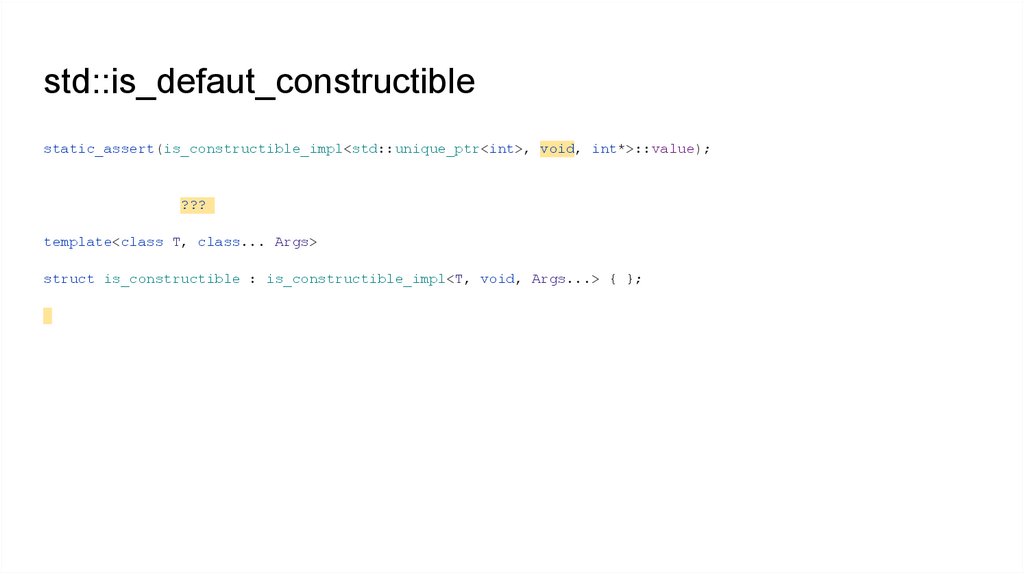

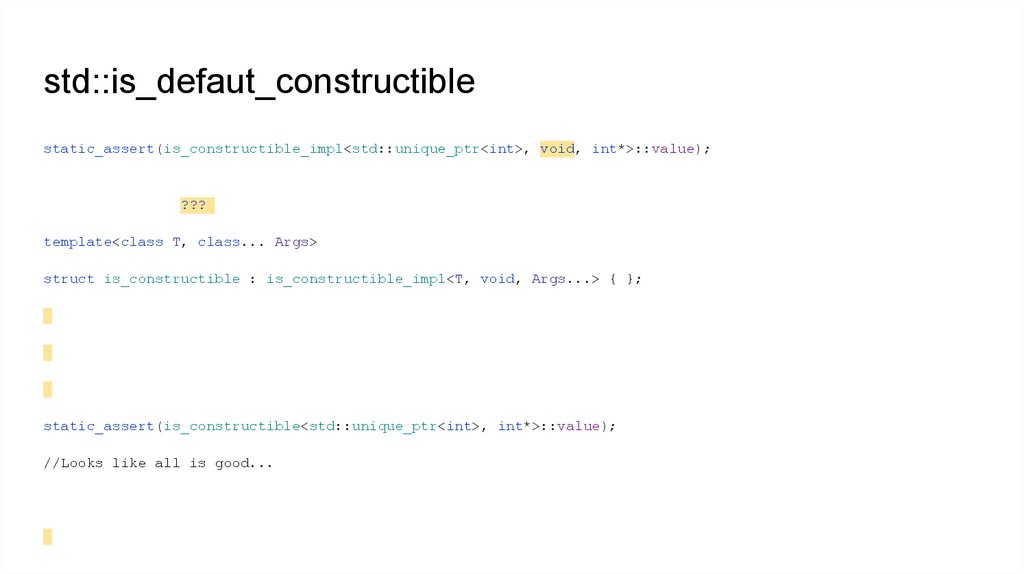
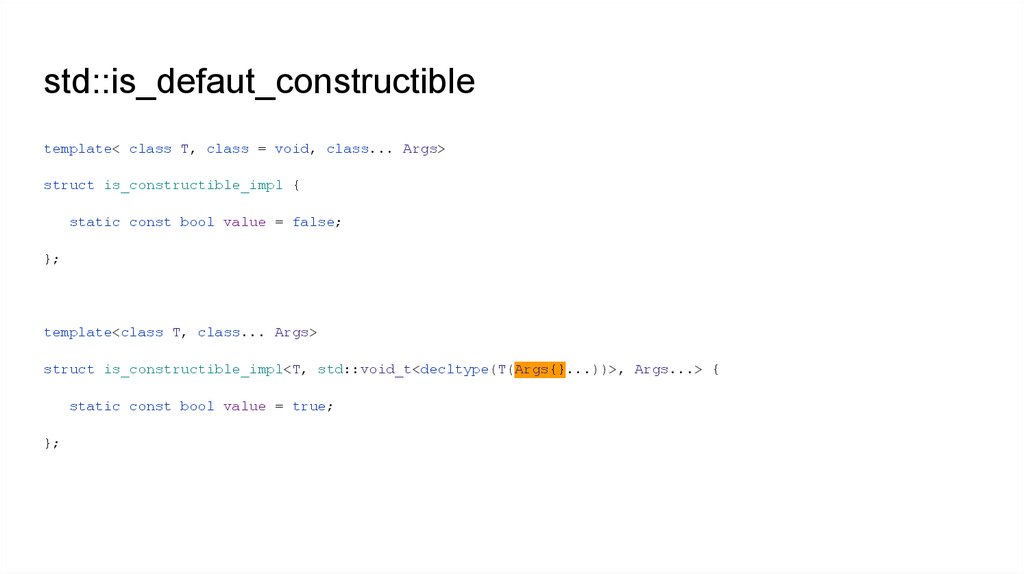

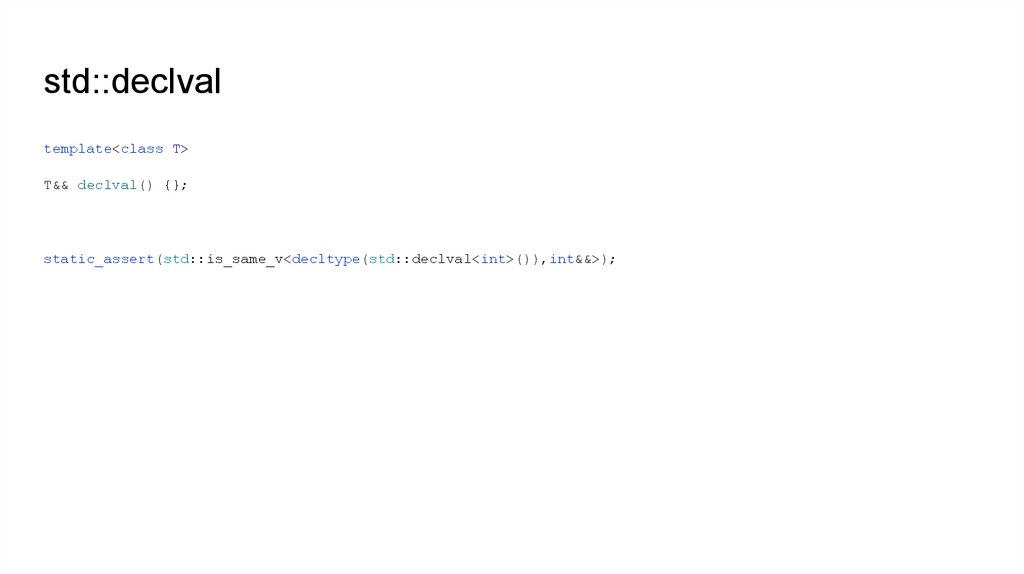
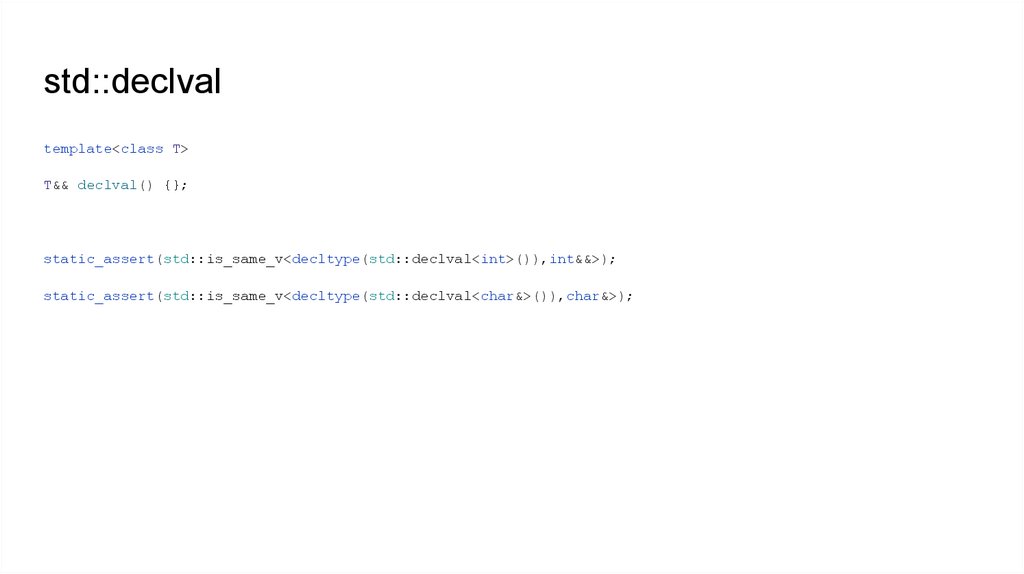
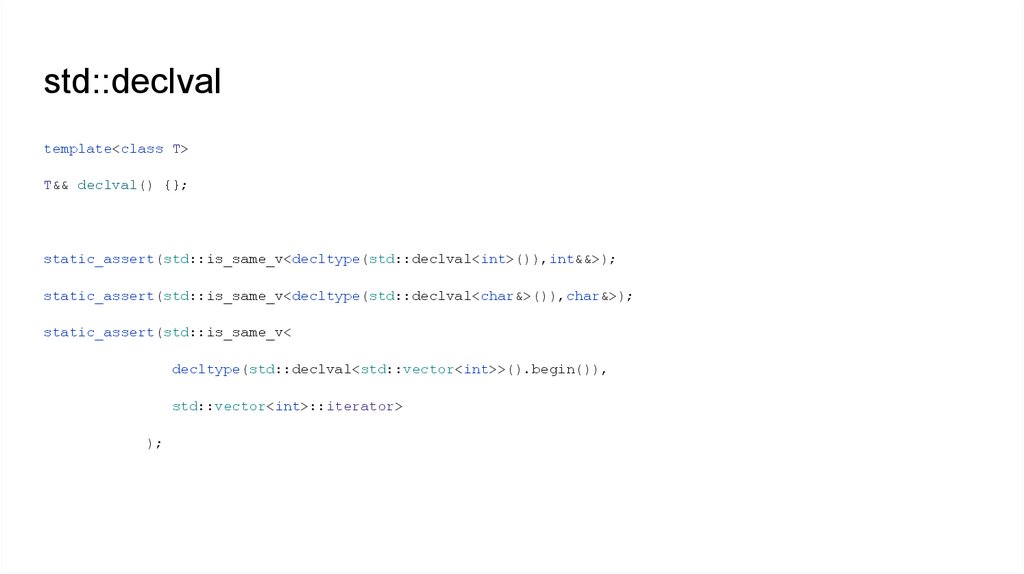
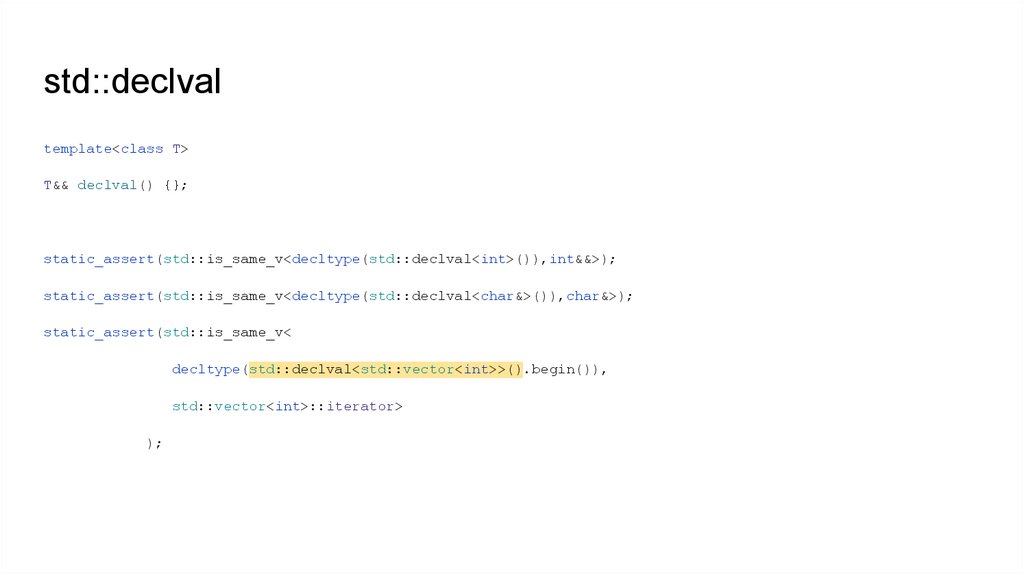
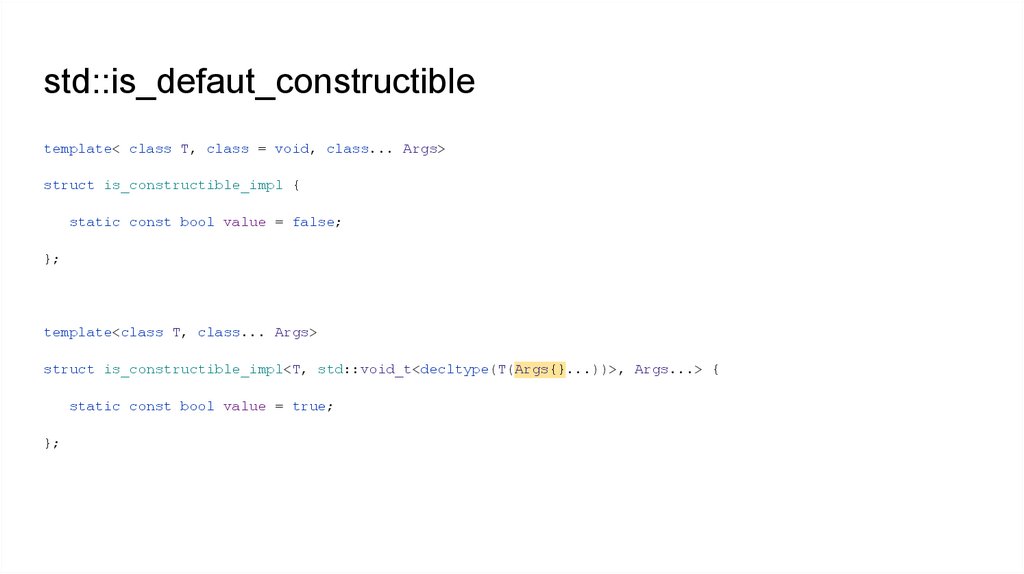
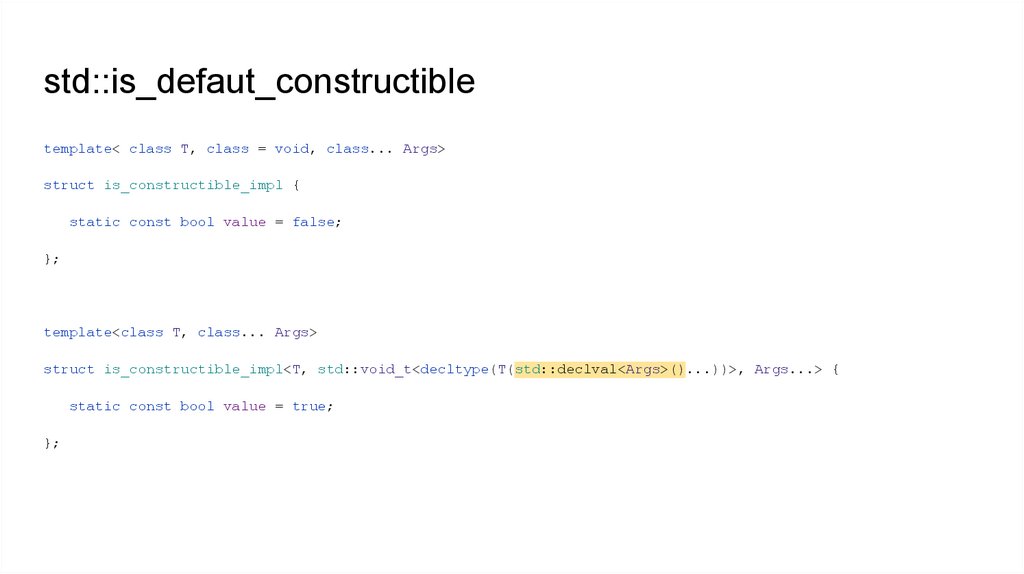
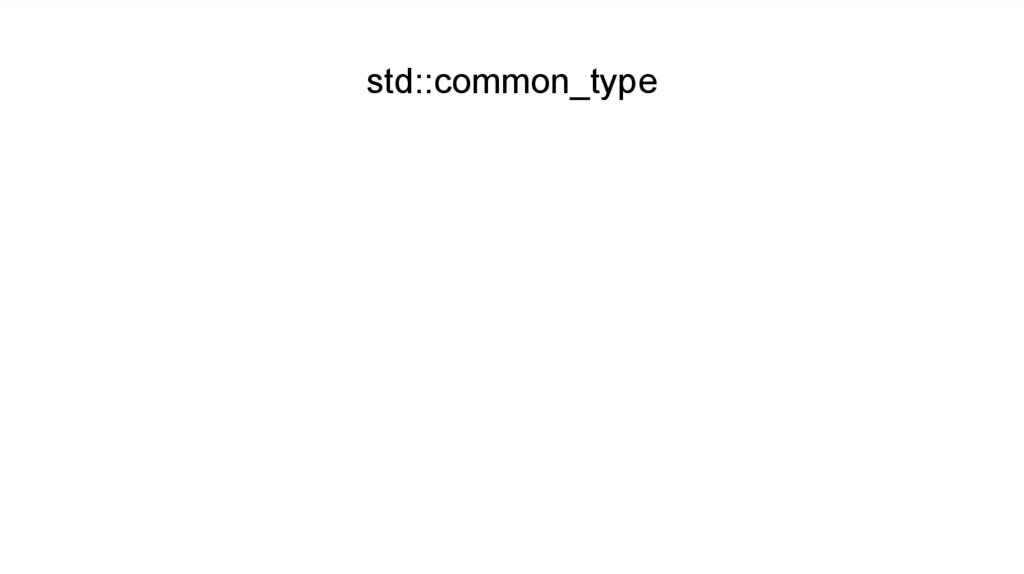
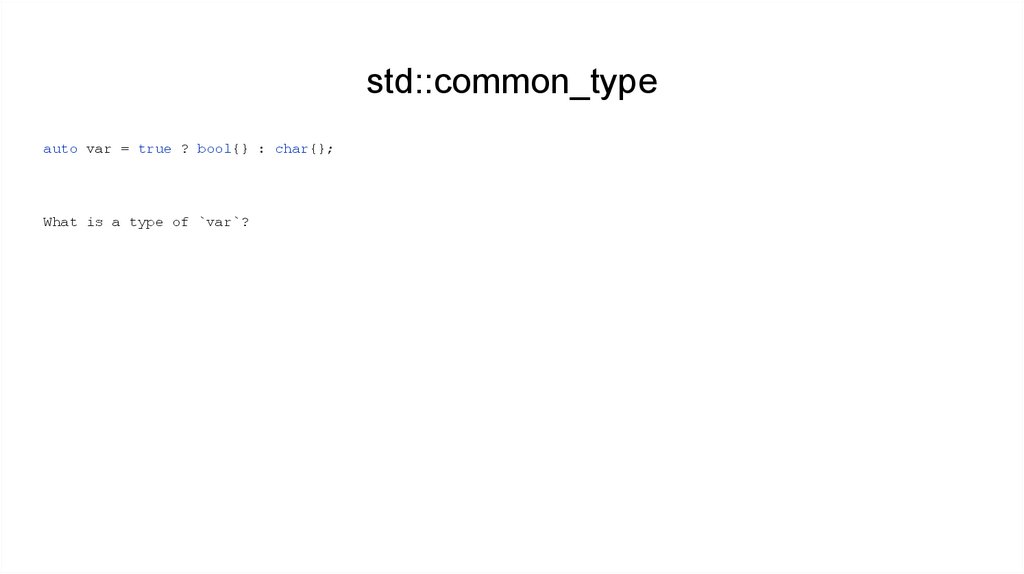
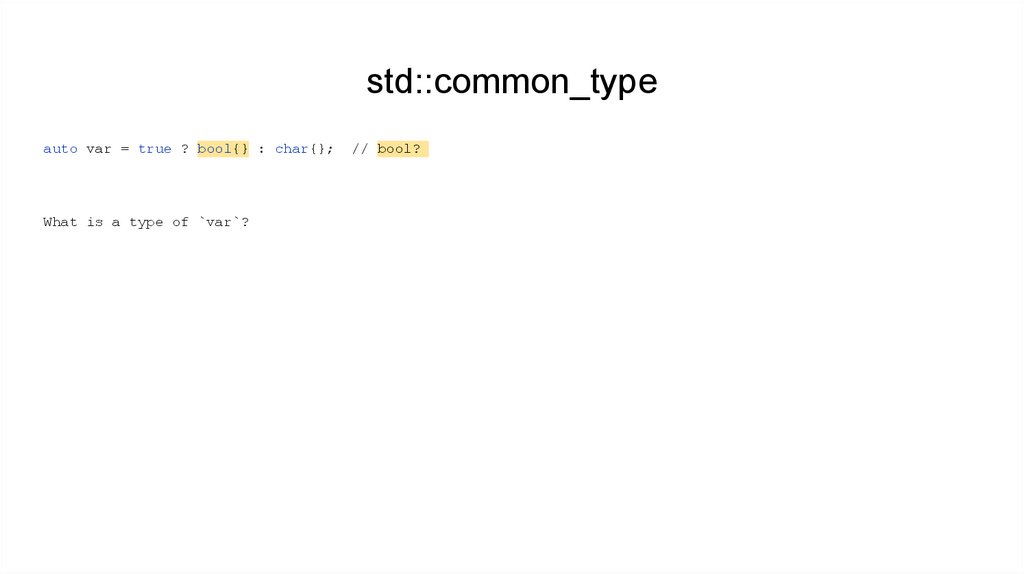
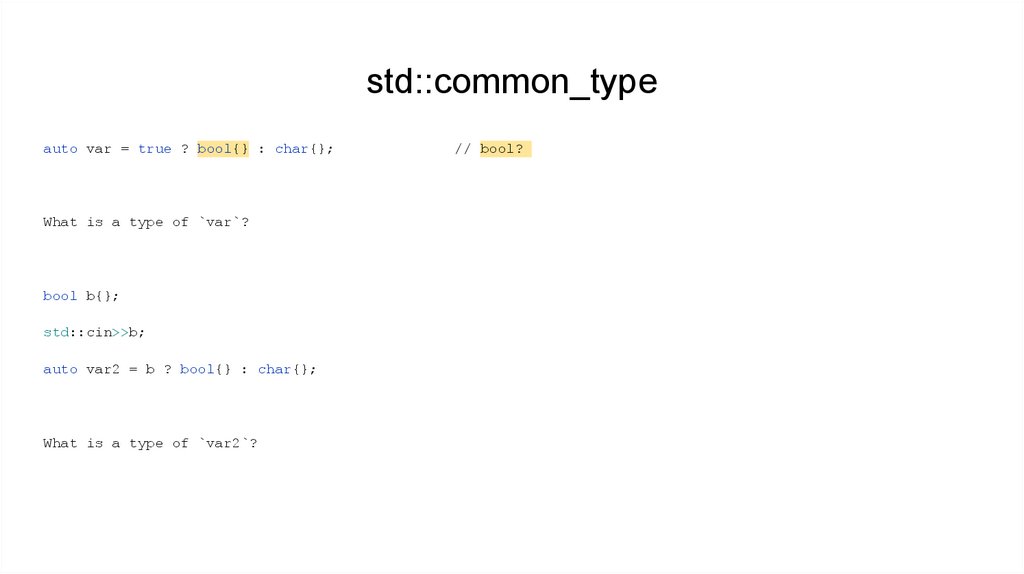
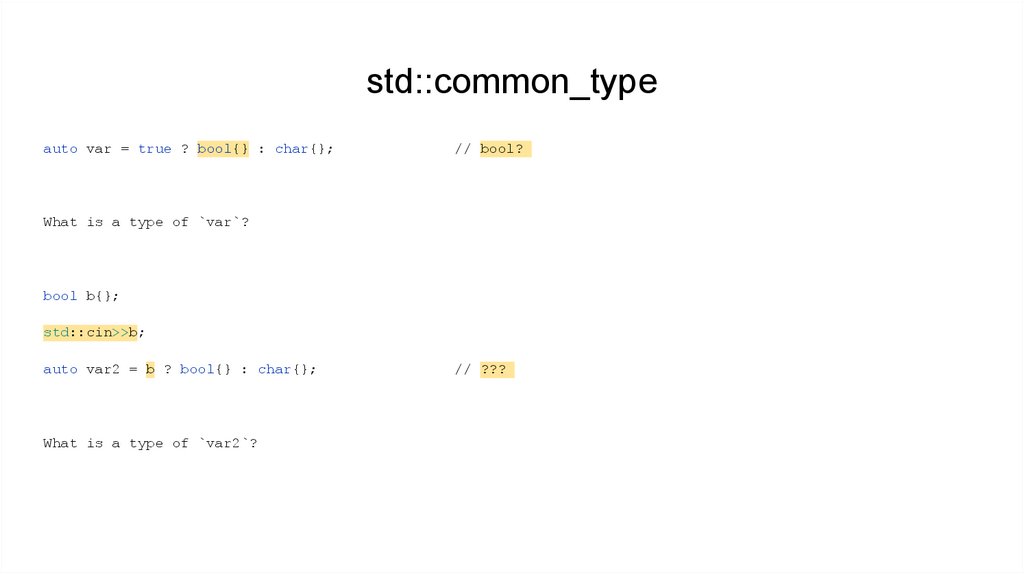
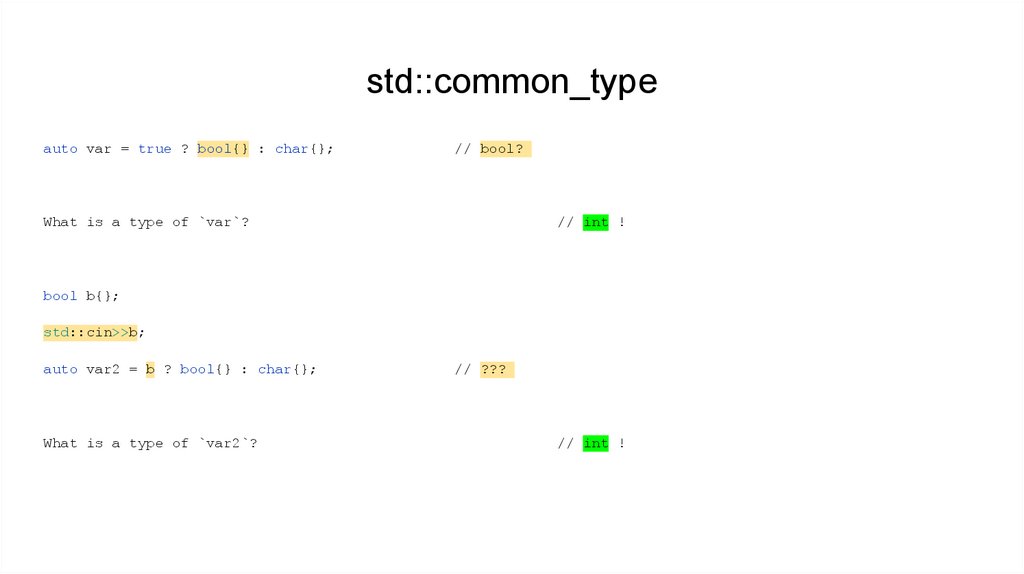
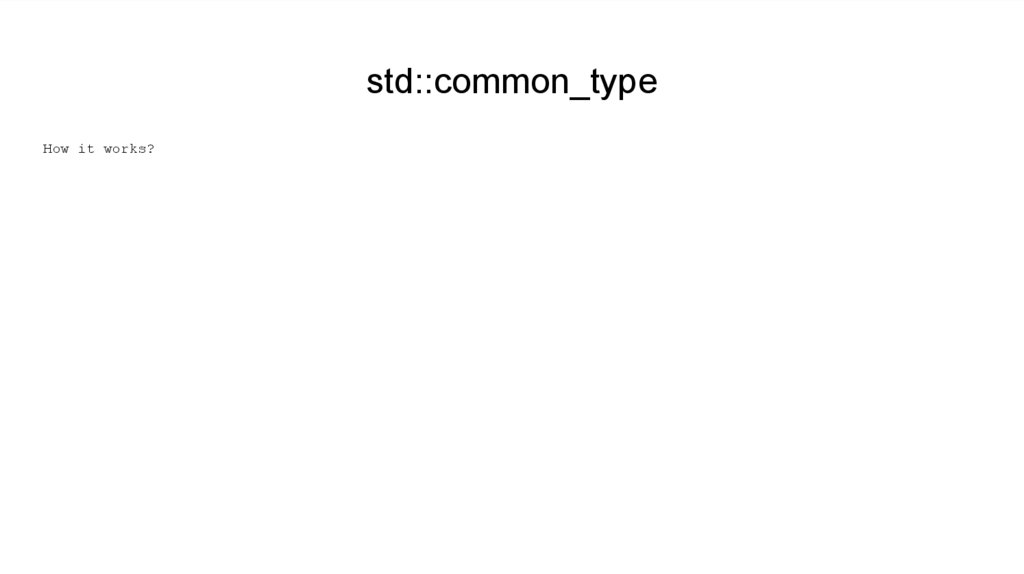
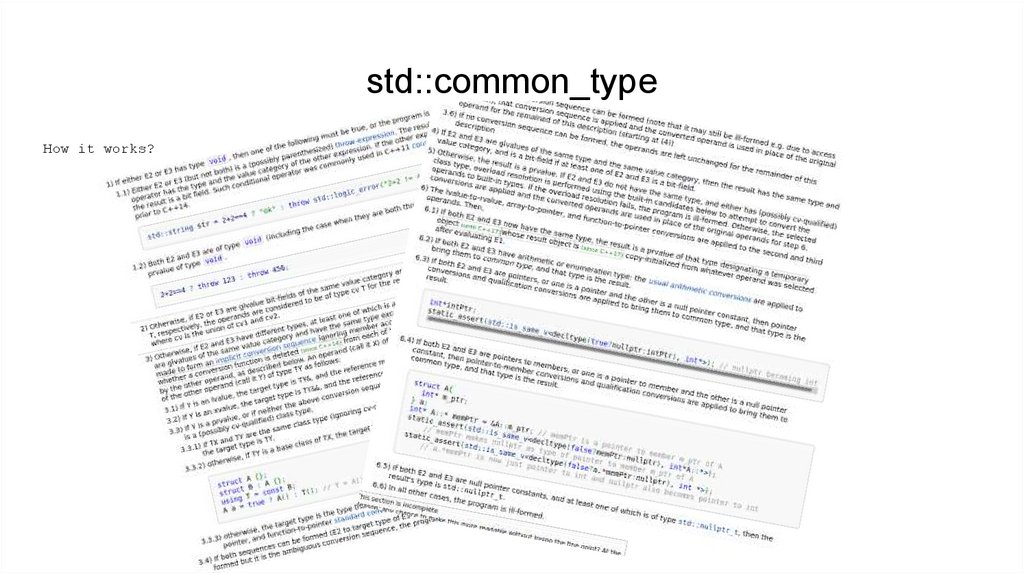
 Программирование
Программирование








